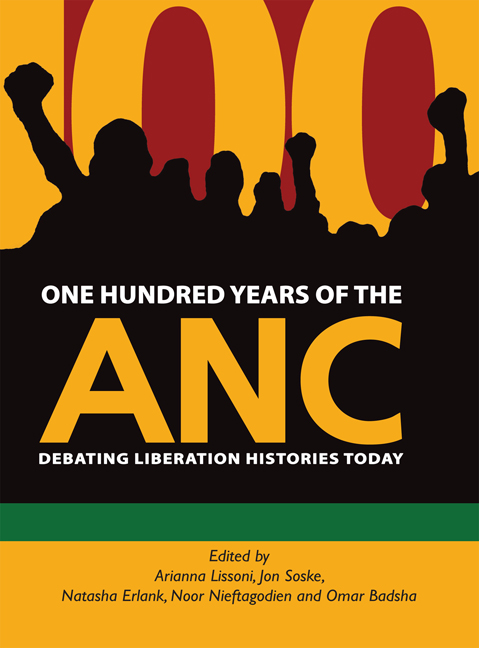Book contents
- Frontmatter
- Contents
- Acknowledgements
- Editorial Note
- FIRST KEYNOTE ADDRESS: Fragmentation and Cohesion in the ANC: The First 70 Years
- SECOND KEYNOTE ADDRESS: A Continuing Search for Identity: Carrying the Burden of History
- Chapter One One Hundred Years of the ANC: Debating Struggle History After Apartheid
- Chapter Two Religion And Resistance In Natal, 1900–1910
- Chapter Three Christianity and African Nationalism in South Africa in the First Half of the Twentieth Century
- Chapter Four Charlotte Maxeke: A Celebrated and Neglected Figure in History
- Chapter Five Imagining the Patriotic Worker: The Idea of ‘Decent Work’ in the ANC's Political Discourse
- Chapter Six Popular Movements, Contentious Spaces and the ANC, 1943–1956
- Chapter Seven Unravelling the 1947 ‘Doctors’ Pact’: Race, Metonymy and the Evasions of Nationalist History
- Chapter Eight The Politics of Language and Chief Albert Luthuli's funeral, 30 July 1967
- Chapter Nine Robben Island University Revisited
- Chapter Ten Shishita: A Crisis in the ANC in Exile in Zambia, 1980–811
- Chapter Eleven Comrade Mzwai
- Chapter Twelve Revisiting Sekhukhuneland: Trajectories of Former UDF Activists in Post-Apartheid South Africa
- Chapter Thirteen Regeneration of ANC Political Power, from the 1994 Electoral Victory to the 2012 Centenary
- Chapter Fourteen The ANC: Party Vanguard of the Black Middle Class?
- Chapter Fifteen Globalisation, Recolonisation and the Paradox of Liberation in Southern Africa
- Contributors
- Index
Chapter Three - Christianity and African Nationalism in South Africa in the First Half of the Twentieth Century
Published online by Cambridge University Press: 21 April 2018
- Frontmatter
- Contents
- Acknowledgements
- Editorial Note
- FIRST KEYNOTE ADDRESS: Fragmentation and Cohesion in the ANC: The First 70 Years
- SECOND KEYNOTE ADDRESS: A Continuing Search for Identity: Carrying the Burden of History
- Chapter One One Hundred Years of the ANC: Debating Struggle History After Apartheid
- Chapter Two Religion And Resistance In Natal, 1900–1910
- Chapter Three Christianity and African Nationalism in South Africa in the First Half of the Twentieth Century
- Chapter Four Charlotte Maxeke: A Celebrated and Neglected Figure in History
- Chapter Five Imagining the Patriotic Worker: The Idea of ‘Decent Work’ in the ANC's Political Discourse
- Chapter Six Popular Movements, Contentious Spaces and the ANC, 1943–1956
- Chapter Seven Unravelling the 1947 ‘Doctors’ Pact’: Race, Metonymy and the Evasions of Nationalist History
- Chapter Eight The Politics of Language and Chief Albert Luthuli's funeral, 30 July 1967
- Chapter Nine Robben Island University Revisited
- Chapter Ten Shishita: A Crisis in the ANC in Exile in Zambia, 1980–811
- Chapter Eleven Comrade Mzwai
- Chapter Twelve Revisiting Sekhukhuneland: Trajectories of Former UDF Activists in Post-Apartheid South Africa
- Chapter Thirteen Regeneration of ANC Political Power, from the 1994 Electoral Victory to the 2012 Centenary
- Chapter Fourteen The ANC: Party Vanguard of the Black Middle Class?
- Chapter Fifteen Globalisation, Recolonisation and the Paradox of Liberation in Southern Africa
- Contributors
- Index
Summary
The origin of African political consciousness in southern Africa can be traced back to the first half of the nineteenth century, to the impact of the Christian missions and to the development of a non-racial constitution at the Cape … The expectation of progressive involvement in a modern state was bolstered by several additional factors. The most important of these stemmed from Christian missionary education, an education which provided moral principles for individual righteousness. Given the questioning and often the partial rejection of tribal ethics and organisation, these principles were then extended to social and political activity, so providing the motivation, not for political assertion, but for moral appeals to justice even if these appeals were not backed up by effective political organisation.
A fairly standard, if polygamous, union of nationalism, modernity and Christianity characterises a portion of the historical literature on the rise of an anti-colonial nationalism in South Africa. It can be summarised as follows: Towards the end of the nineteenth century, some African men converted to Christianity and became educated in mission schools. These men, a new black elite, embraced not only modern political thinking but also modern behaviour and practices. They practiced a mainstream, European-derived Christianity. They became South Africa's first generation of African (not ethnic) nationalists, advocating cross-ethnic alliances in the fashioning of an anti-state politics.
A singular example of this trend, read off from this narrative, was Don Davidson Tengo Jabavu, a Xhosa-speaking Mfengu, journalist, Methodist, lay preacher and political activist educated in the United Kingdom and United States of America. His contemporaries included John Langalibalele Dube of Natal, first president of the South African Native National Congress (renamed the African National Congress – ANC – in 1923) and a product of the American Board Mission, as well as Silas Modiri Molema, a medical doctor active within the ANC from the 1920s onwards. These were men who drew upon their mission experiences and religious training in support of a protest politics characterised in the first few decades after Union by the activities of the ANC. Albeit an elite initially in support of an elite politics, their legacy is omnipresent, if evanescent, in the contemporary politics and remembering of the ANC.
- Type
- Chapter
- Information
- One Hundred Years of the ANCDebating Liberation Histories Today, pp. 77 - 96Publisher: Wits University PressPrint publication year: 2012



